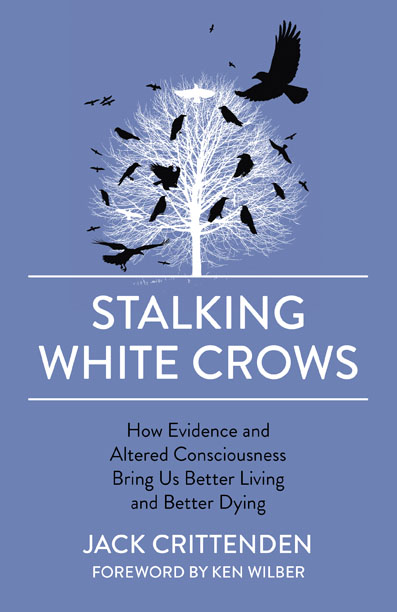Stalking White Crows
How making up our minds and the makeup of our minds can help us live better and die better.

How making up our minds and the makeup of our minds can help us live better and die better.
How making up our minds and the makeup of our minds can help us live better and die better.
Afterlife & reincarnation, Mind & body, Spirituality
How making up our minds and the makeup of our minds can help us live better and die better.
We live in a climate where feelings trump reason and evidence. Lies are treated as “alternative facts.” At the same time, it seems our culture does not want us to treat altered or higher states of consciousness seriously.
Focusing both on evidence and on such states of consciousness can reorient our attitudes. Jack Crittenden asks the reader to think about life after death, about the basis of morality and the essence of spirituality, about the meaning of happiness, about the path of dying, and about the proper role of work in our lives and how education connects to that role.
What if our memories, thoughts, and whole personality lived on after we died? What if morality were based on reasons and evidence and not on God and sacred texts? What if happiness lies not in what we think, how we feel, and what we long for, but in living in the present and in the dying of the self itself?
Experiences of and the evidence on altered and higher states of consciousness can lead us to better lives and better deaths.
Click on the circles below to see more reviews
5 out of 5 stars: Fascinating book! As usual, Crittenden’s impeccable research and firm grounding in philosophical reasoning pays off. The most important chapters to me are the argument regarding the basis of morality and one in which he discusses how the use of psilocybin in terminally ill patients can relieve anxiety and allow joy to take its place. Both allow a more hopeful view of the meaning of existence and of death. ~ Kindle Customer, Amazon
5 out of 5 stars: Crittenden's book is a delightful, easy, and eclectic read. He assembles some rather dense topics and makes them accessible to his readers. I read this book in about two sittings...it was hard to put down! I highly recommend this book. It will certainly cause fellow readers to pause and consider their place in the future. ~ Nicola Mayberry, Amazon
5 out of 5 stars: This book is so important to read if you have ever wondered about life after death, or how to lead your best possible life. If you have ever wondered about a basis for morality that is not based on religion, or what moral education even means, then you will want to read this. If you think there is NO evidence for reincarnation, then you must read this. If you have ever wondered if life is just a meaningless drudgery, then you must read this. If you have ever wondered about the possibility for human happiness at all, then you must read this. If you have ever wondered about the bounds of human consciousness, then you should read this. If you would like to open your mind to the possibility of peace and joy in your soul, then read this. ~ Debra J. Campbell, Amazon
5 out of 5 stars: If you’re looking for a clear-headed examination of things that modern science has ruled out, but you’re not satisfied with the accounts offered by the various religions, this is your book. It provides a systematic analysis of forms of spirituality beyond the canon of the dominant religions. It draws on the insights of various mystic traditions, the Western philosophical tradition down to Socrates, and empirical scientific evidence of phenomena such as near-death experiences, life after death, reincarnation, and telepathy. Through this unique fusion of spirituality, philosophical reasoning, and scientific rigor, this book really helps us understand the nature of human existence and is a great resource in navigating the most difficult topics in this crazy modern world. A must read! Buy it today! ~ Lars, Amazon
5 out of 5 stars: Jack’s background in philosophy lends tremendous insight and credibility to his analysis of the ineffable aspects of humanity, i.e. death, cognition, and purpose. When the robots come for our jobs, will we all become philosophers and would that be a good thing? Jack does an exceptional job of guiding readers through their own ruminations on this and other topics most folks consider the exclusive province of philosophers. ~ Dr. Sean A.Hays, Amazon
.......Today, says Crittenden, we need to see growth in consciousness as a necessary boost in human evolution which, while placing a burden on future generations, provides an opportunity for liberation from patterns of thought and behaviour engendered and captured by materialism in both its scientific and economic forms......Thus I’d very much support Crittenden’s hopes that his book could be a prelude to those adventures in consciousness for people in the future and the kinds of attitudes towards inquiry they will adopt as the ‘robo-economy’ gains ground..... ~ Geoff Ward, Medium.Com